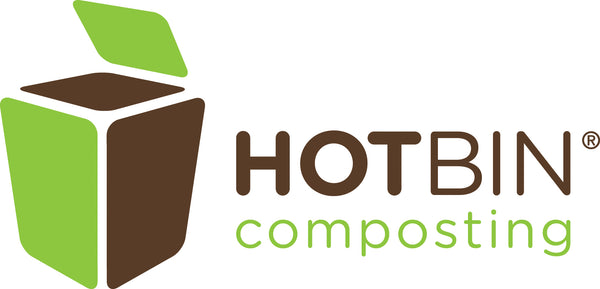Why Office Composting Programs Make Sense!
In response to organic waste disposal banning on cities and states, businesses are starting to promote composting at their offices and conference facilities. At HOTBIN Composting we are starting to sell small quantities of our MK2s composting bin for mid-size facilities, and our 100LT Minis for smaller spaces.
HOTBINs are located just outside their back doors or ramp areas, where food scrap collected is dumped to the HOTBIN composter to produce compost in 30-90 days. The location of the composters is possible due to HOTBINs’ internal charcoal filter that will keep unwanted animals away as well as any complaint from neighboring businesses.
What do office facility personnel need to compost their food waste? In addition to food scraps, they will only need to have a bag(s) of mulch and shredder paper ready to add to each batch, based on suggested proportions. Feeding HOTBIN 2-3 times a week will make it reach and maintain as much as 140 degrees Fahrenheit for fast and successful composting. BTW, office spaces have one ingredient that is a great component to add to any composting pile… coffee! More on why coffee stimulates fast composting on our next short article (below).
Office Composting programs are assisting business owners to comply with local governmental bans and restrictions aimed to reduce and manage organic waste and its impact on the environment. These programs also lessens the load on government waste management operations that are ultimately responsible for collecting and disposing of all organic waste generated by their citizens. Contact us if you are interested in starting an Office Composting Program.
Halfway Composting Houses/Community Composting Services
There is nothing more stressful that knowing that you need to comply with a local ordinance and not being ready to do it. Food waste generators are being challenged to explore more sustainable practices and community composting can render the much-needed services.
Community Composting Services are a convenient solution for those wanting to comply, yet not being ready yet. They offer short-term and long-term solutions. Short-term, for those who want to start composting at home but are not ready to start; and long-term services for those who prefer paying for services conducted outside their residence or business, for a variety of reasons. Furthermore, most offer ‘how-to compost at home’ training and can sell composter at competitive prices.
If you are interested in starting a Community Composting Service location or interested in learning where to find an established one, send us an email at community@hotbincomposting.com.
Coffee Grounds Accelerate the Composting Cycle
Coffee ground are an excellent addition to your composting pile. This becomes handy when composting on office facilities… as coffee is arguably one of the most coveted office staples. An article I read use a ‘sliding-scale’ to measure daily desirability’ of coffee to be much greater than the amount of copy paper used. The same article estimates that a staff of 12 drinks between 2 and 4 cups of coffee a day (16 ounces daily), and brew 168 and 336 cups of coffee per week.
Coffee grounds are rich in nitrogen, providing bacteria the energy they need to produce more heat, thus speeding up the decomposition of organic matter. In addition, coffee grounds lend its aroma to the composting pile, reducing any chance for bad odors.
Is your Composter Too Cold to Compost this Season? It is time to change it for a HOTBIN
You can compost with HOTBIN in Winter. Made from EPP (Expanded Polypropylene), its insulated walls retain the heat produced from composting bacterial activity. If you feed your HOTBIN 2-3 times per week, more bacterial activity is produced, and heat will keep the composting pile decomposing.
If a composting pile grows cold and the pile becomes dormant, you can use HOTBIN’s ‘kick-start-bottle’ with hot water (see instructions) to bring the heap back to normal composting heat up to 86-104°F. That procedure warms bacteria enough so that they can become once again active.
Click to learn more.
Composting in Winter: What’s Available from your Garden?
For many, Winter seems to lack an obvious supply of compostable garden waste, and kitchen peelings take center stage for the compost bin. If you are struggling to keep your HOTBIN fed and operating between 104-140°F (40-60°C) during the winter months, there may be some hidden waste types lurking in your garden that you may not have thought about composting.
Click to learn more.
HOTBIN works as an insulated chimney with three layers:
1) The upper hot active layer; 2) the maturing warm in the middle; and 3) the cool base. Click to view explanatory video.
Add Composting to your NEW YEAR Resolutions!

